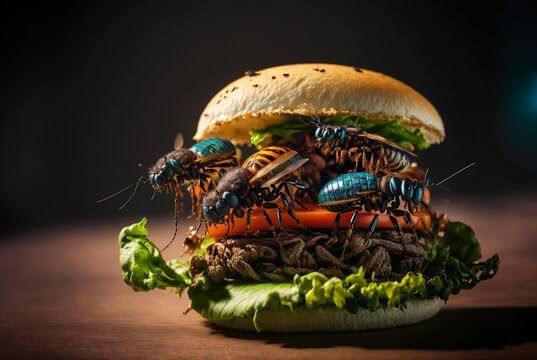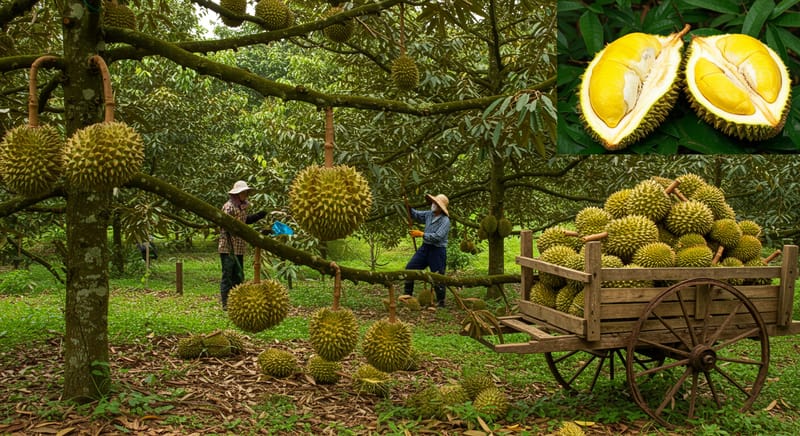Facing the Inevitable: Estonia's Urgent Shift from Traditional Livestock to Innovative Food Solutions Amid Severe Fodder Crisis
Estonia, a small but robust nation on the Baltic Sea, is known for its tech-savvy ethos, with innovations like e-Residency, e-Government, and digital nomad visas. However, the recent severe fodder crisis affecting its agricultural sector is threatening to upend traditional farming methods, and the nation must prepare for a drastic

Estonia, a small but robust nation on the Baltic Sea, is known for its tech-savvy ethos, with innovations like e-Residency, e-Government, and digital nomad visas. However, the recent severe fodder crisis affecting its agricultural sector is threatening to upend traditional farming methods, and the nation must prepare for a drastic shift in its food production landscape.
The fodder crisis, spurred by extreme weather conditions, has put half of Estonia's livestock at the risk of extermination if significant rainfall doesn't arrive soon. "If we do not see rain in the next ten days and temperatures rise above 27 degrees Celsius, a part of Estonian animal husbandry may face the risk of liquidation due to a lack of fodder," warns the Estonian Farmers Federation. This dire situation brings back memories of the 2018 summer, where similar harsh weather conditions in Sweden, Germany, and the Netherlands significantly decreased grain crops and fodder production.
The looming crisis highlights the susceptibility of traditional livestock farming to climate change and its consequences. A transition to more sustainable, climate-resilient, and innovative food production methods becomes not only a viable alternative but an absolute necessity.
In this backdrop, the potential shift towards entomophagy, or the consumption of insects, and cultured meat production emerges as a promising option. Known for their lower environmental footprint, these novel food sources could offer a sustainable and resilient alternative to traditional animal farming. Insects like crickets and mealworms are protein-rich, require far less land and water, and produce a fraction of the greenhouse gases compared to traditional livestock.
Lab-grown or cultured meat, on the other hand, is a form of cellular agriculture that involves growing muscle cells from a living animal in a lab. It presents a significant opportunity to feed the growing population without the negative environmental and ethical impacts associated with traditional animal agriculture.
In the face of this pressing crisis, the challenge lies in overcoming cultural and psychological barriers towards accepting these novel foods. Estonia, as an innovation-driven society, can lead the way in this transition, setting an example for other nations grappling with similar issues.
The imminent threat of losing a significant part of Estonia's livestock might be a hard pill to swallow, but it could serve as a catalyst for change. The crisis, though unsettling, provides an opportunity to rethink and restructure Estonia's agricultural strategies, aligning them with sustainable practices, and climate-resilient food systems.
The dawn of the next era in food production may have been born out of necessity, but it could prove to be the most significant step towards a sustainable future. And as the country grapples with the potential loss of a traditional food source, Estonia stands at the threshold of a new food paradigm - one that promises to be kinder to the planet and capable of weathering the storms of climate change.
Pioneering a Sustainable Future: Estonia's Potential in Leading the Shift to Novel Food Sources
As the reality of the severe fodder crisis continues to unfold in Estonia, pushing the country towards a significant agricultural transformation, the potential for Estonia to pioneer a shift towards novel food sources emerges. The forward-thinking nation, renowned for its technological and digital advancements, has the capacity to innovate in other spheres, like food production.
The impending shift towards entomophagy, or the consumption of insects, and cultured meat production could be the key to a resilient, sustainable, and future-oriented agricultural sector. As Estonia faces the prospect of losing a significant part of its traditional livestock, the country is uniquely positioned to lead the way in this transformation.
Estonia's tech-savvy ethos and its reputation as a 'digital society' place the country in an ideal position to embrace and invest in cutting-edge food technologies. The country has already demonstrated its ability to adapt to new technological paradigms, making it a potential leader in promoting and adopting these new food sources.
Cultured meat and insects are not just alternatives; they represent a new wave of sustainable food production. These novel food sources are more efficient and environmentally friendly than traditional livestock farming, producing fewer greenhouse gases and requiring less land and water. Estonia, with its established technological sector, could become a hub for research and development in these areas, fostering advancements that could revolutionize the global food system.
Moreover, Estonia's reputation for openness to new ideas and willingness to challenge traditional norms makes it a likely candidate to break down the cultural and psychological barriers associated with the consumption of insects and lab-grown meat. By leading the way in adopting these novel food sources, Estonia can play a crucial role in changing societal perceptions and food consumption patterns.
The road to change may be challenging, as it necessitates adjustments in cultural norms and dietary habits. However, the potential benefits in terms of sustainability, resilience to climate change, and efficiency in food production are immense. As the world faces increasing pressure from population growth and climate change, the need for sustainable food sources has never been more urgent.
The potential for Estonia to lead this shift presents an exciting opportunity for the country. The severe fodder crisis, although a significant threat to traditional farming, could be the catalyst for a pioneering move towards sustainable food production. As Estonia navigates this transition, it has the chance not only to safeguard its own future but also to inspire and influence the broader global movement towards a sustainable and resilient food system.




